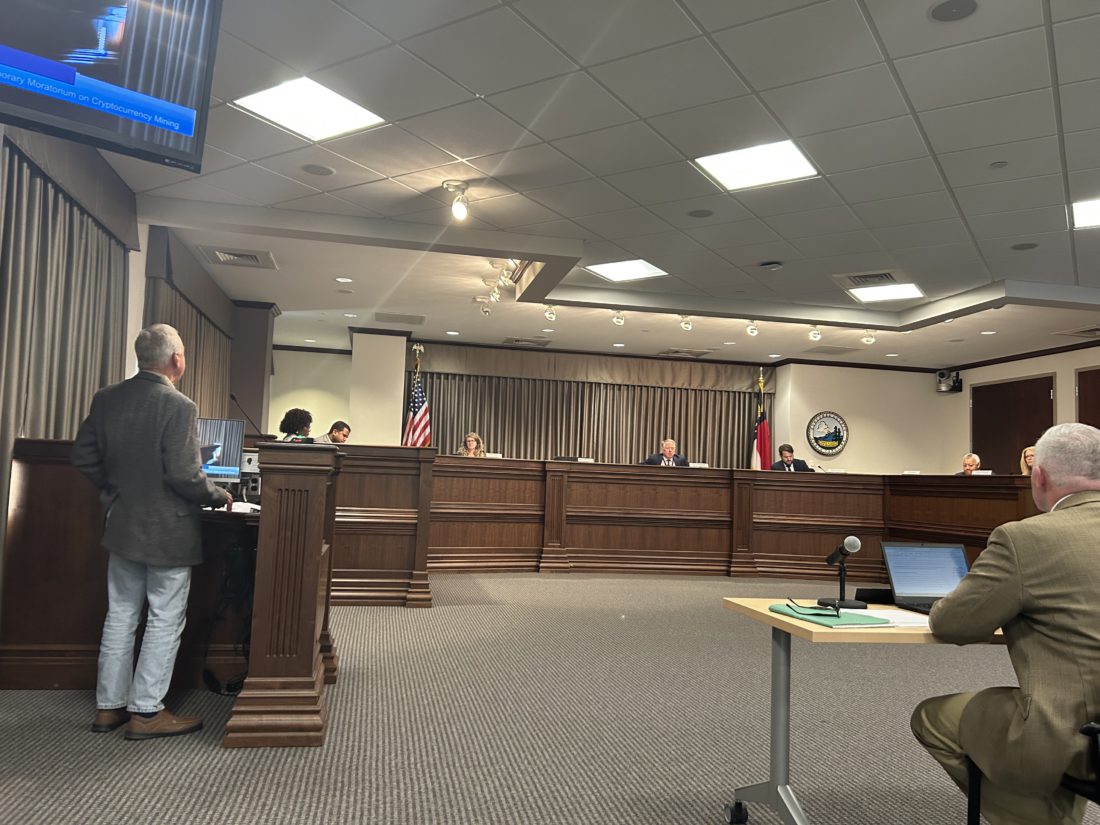Buncombe County residents concerned over the potential impacts of cryptocurrency mining facilities can rest easy — at least for now.
On May 2, the county Board of Commissioners voted unanimously to approve a one-year moratorium on crypto mining facilities. The measure had first been discussed publicly by the commissioners in February; at an April meeting, Commissioner Terri Wells said she’d floated the proposal to county staff after hearing complaints from Cherokee County residents about noise and pollution created by the facilities.
Cherokee County has at least three crypto mines, or warehouses of computers that process transactions in exchange for cryptocurrency, in operation. It is unclear whether any mining facilities were planned for Buncombe County before consideration of the moratorium.
Buncombe’s land use ordinances do not currently include crypto mining as a specified use, according to a staff report prepared for the May 2 meeting. Nathan Pennington, Buncombe’s planning director, said the pause will allow the county to develop regulations in tandem with the county’s comprehensive plan, which seeks to develop standards for all land use over a 20-year period.
“This one-year pause gives us time to work with residents and Planning Board members to craft standards for the newly defined use. … [It] also gives us time to benchmark with other communities and see what standards we might want to put in place,” Pennington said. “We don’t often bring a moratorium to the table.”
During public comment, three people spoke in favor of the moratorium, citing concerns over nuisances associated with crypto mines and their energy consumption.
“I live in the rural part of the county, and we live out there for a reason. We like being outside at night or being outside and not hearing constant roar and loud noises,” said resident Ken Brame, who co-chairs the Western North Carolina Sierra Club’s conservation and political committees. “If one of these is constructed, it’s going to be in the rural parts of the county, and it’s going to take away our quality of life.”
Four people were opposed to the motion. Resident Craig Duetsch criticized the moratorium as a drastic move that could stifle economic development in the area for decades to come.
“I watched the briefing where the mining moratorium was introduced, and I was encouraged by the commissioners who stated that they didn’t know much about the subject. This made me hopeful that the county will approach this topic with curiosity,” said Duetsch. “That being said, I do not believe that the county looked at alternative solutions to a moratorium before deciding that this was the only path forward.”
Commissioners hear update on short-term rental bills
During their pre-meeting earlier May 2, commissioners also heard an update about progress on their priorities at the state legislature, as delivered by Whitney Christensen and Trafton Dinwiddie, lobbyists with the law firm Ward and Smith.
Among the most significant proposals for the county, said Christensen, are two bills aimed at limiting local governments’ ability to regulate short-term rentals. Senate Bill 667, sponsored by state Sen. Tim Moffitt, R-Hendersonville, would prohibit local governments from placing many limits on STRs. The city of Asheville, for example, could no longer enforce an ordinance that restricts whole-house stays of less than 30 days throughout almost all of the city.
Christensen said that the county’s lobbyists had been participating in stakeholder groups for the proposed legislation and “can report that we’re having good conversations.” She shared no other information about the progress of the bill.
Another bill, Senate Bill 325, would limit the regulation of online marketplaces such as Airbnb and other STR platforms. That bill, said Christensen, now includes language recommended by Buncombe lobbyists clarifying that powers already held by cities, counties or the state will not be impacted.
“We still don’t view it as perfect, but it’s definitely significantly improved over what it was and far better than what it could be in some of the things we’ve seen proposed or introduced in other states,” Christensen said.




Before you comment
The comments section is here to provide a platform for civil dialogue on the issues we face together as a local community. Xpress is committed to offering this platform for all voices, but when the tone of the discussion gets nasty or strays off topic, we believe many people choose not to participate. Xpress editors are determined to moderate comments to ensure a constructive interchange is maintained. All comments judged not to be in keeping with the spirit of civil discourse will be removed and repeat violators will be banned. See here for our terms of service. Thank you for being part of this effort to promote respectful discussion.